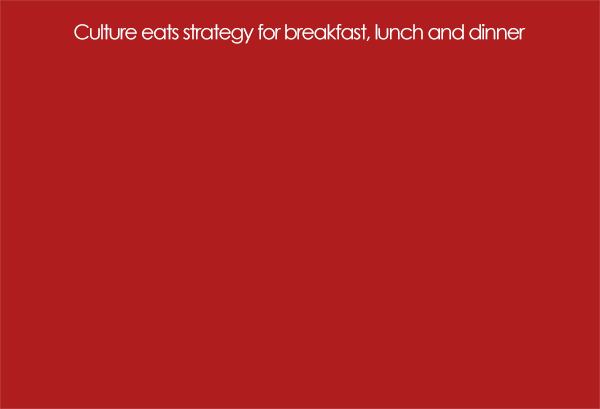Why leaders should care about organizational culture
Recently I facilitated a discussion around this question “What is the relationship between culture and strategy?” – Why should we care about corporate culture – on LinkedIn. The many responses included rich and varied perspectives and opinions on culture and strategy, its meaning and importance.
I include several distinctive views below, illustrated by direct quotes from the LinkedIn discussion thread – unfortunately it was not possible to acknowledge everyone who made helpful contributions.
K.N. Krishna Swamy:
Culture is the foundation – strategy is the path.
Monika Gluszak:
Culture eats strategy for breakfast …. you can’t get any stronger message that that …. unfortunately a message that is all too often forgotten when drafting corporate strategies.
Peter Alderslade:
Strategy is the plan to achieve the goal. Culture is the organizations beliefs, morals and procedures. As Steve say’s “how we do things around here.” Consequently, culture shapes strategy.
Peter Gruben:
Strategy tells us how to get from A to B and culture determines how we behave during this journey. It gives us the opportunity to differentiate our behaviors from animals and ensure success on a longer term.
Bryan Fielding:
No matter how good the strategy, without the internal culture of the organization supporting that strategy, it is unlikely to succeed as a change in strategy will undoubtedly result in a degree of organizational change … which many cultures will react negatively against and work against the strategy rather than for it.
Christian Fournier:
As much attention must be given to understand, measure, build/change CULTURE than it is to define strategy, improve organization, etc ….. Culture can be an extraordinary success or failure factor. Management shall then make sure to understand and CHALLENGE the way actual company culture is impacting the company business.
Tehani Mott:
Culture and strategy go hand in hand. You need to define your strategy and ensure your culture supports it.
Santiago Olmedo Bach:
Culture is an intimate part of company strategy as it drives the “why’s” of any business organization. Many companies working on the FMCG industry are passionate about organizational culture and how it can help the business strategy moving forward. Mission statement is also a good indication on how far a company has gone looking for their own identity while driving a complex business agenda.

John Schultz:
Culture is the display of collective behavior. It is influenced by a set of shared norms and values. Every organization exhibits a culture. The departments within the organization have a culture. Anytime people work together for an extended period of time, a culture is formed. It’s the force that guides and directs how people will interact with one another and deal with those beyond their group.
Since culture has such a large impact on individual actions and how people accomplish work, there is an overwhelming temptation to fiddle with cultural attributes — values, norms, beliefs, symbols, philosophy, and environment. However, culture is created and shaped by a cascade of influences. The attributes displayed are a product of other actions. These are things that can’t be easily manipulated. As a team or individual considering how to make upgrades permanent, don’t try to reshape cultural attributes. Focus instead on those mechanisms that drive their formation and will influence changes in their expression.
Ronald Morauw Maréchal:
Structure follows strategy, well, so does culture. Both strategy and culture are guidelines. Strategy is a guide for decision making, culture (through ‘values’) is a guide for actual behavior. A culture isn’t right or wrong in itself. It is either supporting a strategy, or it isn’t. Strategy therefor determines what is the ‘right direction’, Culture supplies the constraints. A good strategy will only work if the culture supports it. If it doesn’t, change the strategy, or change the culture.
Mike Frommelt:
I’ve always thought of culture as “who you are” and strategy as “what you plan to do”. I agree the two are very closely linked, but also believe culture has much more power than any given strategy. If the employees in the company cannot get behind a strategy fully for whatever reason, it is doomed to fail.
Stephen Rosling:
Management teams in the USA and UK are skewed from the natural distribution of Myers Briggs types within the whole population. Typically they are composed of fewer people of the feeling types and fewer people of the perceiving types. This means that management teams, when making decisions around change, are more likely to put emphasis on the business case for change, and less likely to think or worry about the effect on people. This is seen in most change programmes in most organisations.
Ella Minty:
To make a strategy truly successful, it needs to appeal to emotions and values … Culture, however, has its rationality, too: it is a business product whose aim is to achieve either tangible objectives or to change certain approaches or attitudes towards the business.
JP Donnelly:
Strategy is capability, culture is suitability.
Philip Flynn:
This is a bit like horse and carriage you can’t have one without the other …. having said that strategy is actions (not always unfortunately) and culture is behaviour … strategy is what’s done and culture is how it’s done….of the two, culture is the more important in the long term … example Apple: many different strategies over the years but one sustaining culture.
Ondrej Rudolf:
We can have detailed action plans all over our whiteboards but without the will and faith of humans they’re just nothing. And faith, I assume, is a cultural thing.
Rachel Wreyford:
I believe that strategy is the mirror image of culture in respect of relevance and success. If the culture is that staff have a voice, are engaged with developing and implementing strategy then the strategic future will be successful. If the culture does not support this engagement then we will generally see band aid strategy and limited results. This is why The Bigger Picture Program is focused on building employee engagement and provides tools and processes to strike at the HEART of leadership for an empowered culture.
Short URL & title:
Why should we care about corporate culture — http://www.torbenrick.eu/t/r/jbd
Share it:
If you enjoyed this article, please take 5 seconds to share it on your social network. Thanks!







I believe that strategy should not be product of blue heaven.It should necessary be product of organizational values,practices and behavior;or else it becomes fiction or heavenly matter.Therefore,whoever wants to craft strategy must craft in such way that suit to the productive culture of a given organization.
There is an overwhelming (as seen in comments here) agreement of the importance of culture in an organization as a foundation that supports (or detracts) from successful implementation of a strategy… Problem is, how do you effectively measure “Culture”. The very etherial nature of culture is the problem. We can easily define and measure implementation and results of strategy, but not so easily the same with culture. That which cannot be measured in modern business is often ignored all together or at least not pro-actively managed. What I haven’t yet seen discussed here is the importance of Leadership in the culture equation. So goes the leadership so follows the organization! The importance of leadership commitment or lack of to the organization’s canonized core values cannot be understated. If you were to do a blind poll of employees in most organizations today as to whether they believe top management demonstrates a commitment through action to the company value statement, we would most likely be shocked at the results! Too often very bright people in the business world confuse leadership with management expertise. Though it is ideal that top management possess both traits… to often it is not the case! True leaders influence individual thinking and choice making, not merely direct people’s actions! If Leadership supports a position that the company’s best interest is the best interest of the individual and then consistently models that… only then will the true power of organization be realized… Creative solution making often comes at the pointed end (employees directly performing the functions), however if the company culture does not support employees “thinking” instead of “doing” and does not facilitate bottom edge employees bringing forth their ideas and solutions to the table, the competitive edge is very much dulled… if not lost altogether. So Strategy is indeed very much at the mercy of the organization’s culture.